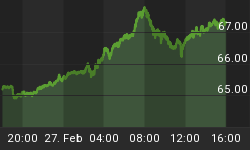In forecasting the consequences of current economic policy, many pundits are downplaying the risks associated with the surging national debt and the rapid expansion of marketable Treasury securities. Their comfort stems from the belief that a staggering debt burden will be manageable as long as interest rates remain extremely low; and, as they believe the Fed is in complete control of setting rates across the yield curve, they see no danger of rates ever rising past the point of comfort. Those who subscribe to this fairy tale forget that, in real life, there are many more hands on the interest rate steering wheel.
The Congressional Budget Office estimates that the 2010 deficit will exceed $1.3 trillion and total US debt now stands at $13.4 trillion (92% of GDP). That's a lot of debt that needs floating. Yet, the 10-year note is yielding 2.8% -- which is 4.5 points below its 40-year average of 7.3%! Experience teaches that even moderately long-term investors should be expecting rising rates. Regardless of the extreme and obvious misalignment of fundamentals and bond prices, the mantra from the dollar shills remains firm: "The US dollar will always be the world's reserve currency, and the US bond market will always be regarded as the safe-haven depository for global savings."
With interest rates having been so low for so long, it's understandable that many people have forgotten that central banks are not ultimately in control of interest rates. It is true that the Fed can be highly influential across the yield curve and can be especially effective in controlling the short end. But, in the end, the free market has the last word on the cost of money.
Although the Fed has certainly created enough new dollars to send prices higher, recessionary forces are, for now, disguising the evidence of runaway inflation. But when inflation finally erupts into the daylight, it will be impossible for borrowing costs to stay low. No one can realistically be expected to loan money below the rate of inflation. To attract buyers, the Treasury will have to offer a real rate of return.
Since our publicly traded debt level is increasing while our personal saving rate is not, we must inevitably rely more and more on foreign creditors to purchase our bonds. The problem is that the Chinese have been net sellers lately, and the Japanese saving rate is chasing ours down the tubes. Europe is also clearly suffering through their own sovereign debt issues. If not the Fed, who then will buy?
At this point, many economists breathe a sigh of relief. Since the Fed has no investment objectives, it could care less how much it loses by buying low-yielding Treasuries. Given that the Fed has an unlimited supply of dollars to buy such debt, it could simply choose to pressure rates lower indefinitely, so long as that policy stance is deemed necessary for a weak economy.
I concede that the Fed can always place bids for US Treasuries, and keep those rates low, but does that mean all debt markets will follow suit? Will private banks continue to offer rock bottom mortgage rates if housing defaults soar or inflation rises? What about the corporate bond market and municipal debt? Can the Fed order a bank to loan to a company at a rate the bank does not find profitable? The only way to keep rates in all debt markets in line would be for the Fed to buy all kinds of debt, not just Treasury debt. Such a policy has never been considered, let alone attempted, by any major economic power.
And what will our foreign creditors think about such a strategy? Anyone with the ability to move investments outside the US dollar would clearly do so, to avoid the wholesale debasement that such an inflationary policy would create. Once you take the argument to its logical conclusion, it is plain to see how futile, ignorant, and dangerous an attempt to hold all rates down would be. Americans can only hope Fed Chairman Bernanke isn't as foolish as his groupies.
Ask any historian of Germany, Argentina, Bosnia, or Zimbabwe why interest rates skyrocketed during their respective battles with hyperinflation. Why were their central banks unable to control borrowing costs?
In the end, central banks can only temporarily distort the savings and demand equation. The more the Fed prints, the higher the eventual rate of inflation will be. If mainstream pundits truly believe the Fed can supplant the entire public and private market for debt indefinitely, then I don't want to be around when that fantasy inevitably becomes a nightmare.
For in-depth analysis of this and other investment topics, subscribe to Euro Pacific's Global Investor Newsletter. Click here for your free subscription.
Click here to download Euro Pacific's Special Report: My Five Favorite Gold & Silver Mining Stocks.
Be sure to pick up a copy of Peter Schiff's just-released economic fable, How an Economy Grows and Why It Crashes.















